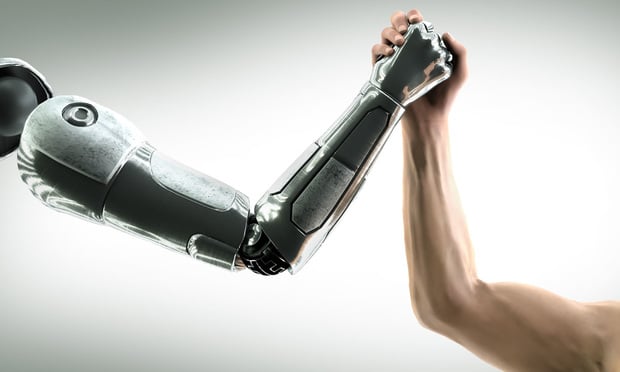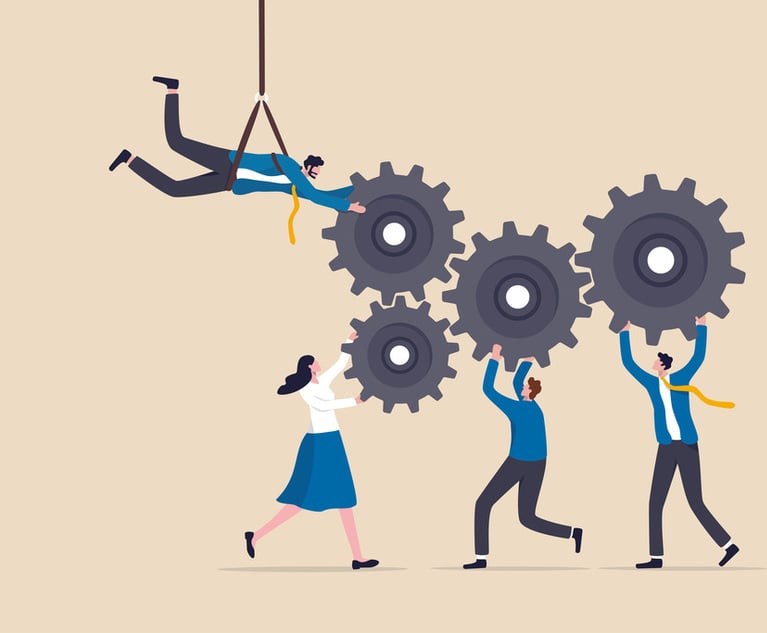Breaking Down Silos Between Tech, Firms and Academia to Reach Innovation
Collaboration, not competition, will be the key to keeping pace with exponential growth in technology, leaders of Vanderbilt Law School's Program on Law & Innovation argue.
December 15, 2017 at 08:06 PM
6 minute read

The essence of legal economics is professional excellence in legal service delivery embedded in a sustainable business model. In recent years, there has been a significant focus on the latter while assuming the existence of the former. To improve the delivery of legal services, innovation in law must take into account the conflicting silos of law schools, legal practice and legal technology. Collaboration among these essential components of today's legal practice is critical.
The Second Machine Age may be the most influential book we have read this decade. The authors Erik Brynjolfsson and Andrew McAfee (both computer scientists at M.I.T.) make a compelling case for a radical shift in commerce, culture, and professional services needed to succeed in an exponential age of technology development and the explosion of information. In the authors' view, the first half of the machine age (from the advent of the steam engine until 2006) was a journey of human progress in a predictable linear line. Characterized by competition and scarcity, the first half of the machine age was a winner-take-all approach to success and achievement.
Arrival in an exponential age does not take place in an instant, but at a rate of change measured by the proverbial “hockey stick.” When the rate of change begins to double in decreasing segments of time, the early stages of change look very much like the linear era. However, after passing “the knee of the curve,” the impact of change becomes unforeseeable.
As further evidence of our entry into an exponential age, the global leaders of the IBM Watson Legal initiative recently forecast a digital exponential age will be reached by 2020 at which time the digital data generated by a global computing capacity will double in volume each day. Unassisted human minds alone are incapable of translating that degree of information into meaningful action.
Consequently, The Second Machine Age suggests that competition will no longer reign supreme. Rather, collaboration will be the characteristic of human achievement in an exponential age.
Indeed, the M.I.T. Sloan School of Management and Deloitte just released “Redesigning Work,” its special report on redesigning work in light of these foundational challenges to the way in which work is done.
According to the report, the key characteristics of how work is done in an exponential age include:
- Design thinking
- Agile methodologies
- Cognitive diversity
- Computational engagement
These traits require a collaborative workplace in which various disciplines “come to the table” as equals, capable of learning from colleagues with different training and skill sets in order to solve increasingly complex problems.
Historically, a collaborative mindset has been foreign to the practice of law. To be both professionally excellent and to maintain a sustainable business model requires more than legal expertise alone. Lawyers in an exponential age must learn from and work with other disciplines which inform the business of law in service of the client.
Unfortunately, legal business and the profession maintain their own silos within the separate silo of law. Traditionally, law schools have taught legal theory and precedent but have not prepared law students to practice law. Law firms and legal departments are under increasing pressure to deliver legal services “better, faster and cheaper” with no compromise in quality. Preparing young lawyers to practice law well is an investment of time which must produce quick returns on investment. Likewise, legal technology, although burgeoning in recent years, tends to provide “bright shiny new things” that are not always consistent with the way lawyers practice law and the manner in which clients expect legal services to be delivered.
The time for promoting collaborative working relationships in the delivery of legal services has arrived. To maximize the potential for working well with other professional disciplines (i.e. design thinking, agile methodologies, neuroscience and computer technologists), the three core silos in law (law schools, legal practice and legal tech) first must demonstrate a capacity to do so themselves.
The notable innovations taking place in the legal industry today demonstrate this reality and encourage more to come.
Law Schools
A number of law schools have staked their claim to legal innovation by adding multi-disciplinary courses to their curriculums. Several schools are now offering courses in design thinking, legal project management, computational law and other interrelated disciplines. However, American Bar Association law school guidelines disfavor law school instructors who are not themselves lawyers. Although sound in theory, this practice discourages viewing other disciplines as valid. To move fully into the experiential form of legal instruction required to help prepare law students for the practice of law in a more relevant fashion, law schools need to create meaningful roles for those whose expertise is critical to the level of service clients expect from “today's lawyer.”
Legal Technology
Legal tech has enjoyed a spurt of investment and development activity in recent years. However, lawyers complain that legal tech is not intuitive nor does it work in the way lawyers need it to work. Technology architects and engineers have great ideas and deliver amazing products. However, unless built and configured to work like lawyers and their clients need them to work, they are not very useful. Collaboration with practicing lawyers is necessary to improve the tools of legal tech.
Legal Practice
In-house and outside lawyers are under great pressure to deliver high quality legal services in a less costly and more efficient manner. Law schools and legal tech can assist in this journey if they join the practicing lawyer to understand and deliver their unique brand of services in collaboration with the users of those services.
To advance this effort, Vanderbilt Law School will host the Summit on Law & Innovation in Nashville on April 30, 2018. Bringing together an interactive global group of legal, academic and technology professionals, we will explore and engage in designing ways to bring down the walls of our silos and improve collaboration among the professionals responsible for innovating in an exponential era.
Larry Bridgesmith, JD, is an adjunct professor and coordinator of the Program on Law & Innovation at Vanderbilt Law School. A practicing lawyer for 40 years, Larry is the CEO and co-founder of Legal Alignment developing DASH, an AI technology for lawyers and their clients to help improve the delivery of legal services.
Caitlin (Cat) Moon, MA JD, teaches legal design at Vanderbilt Law School and counsels law schools, firms, and corporate legal departments on bringing their work into alignment with the 21st century using the tools and mindsets of human centered design. With Larry, she is a co-founder of Legal Alignment.
This content has been archived. It is available through our partners, LexisNexis® and Bloomberg Law.
To view this content, please continue to their sites.
Not a Lexis Subscriber?
Subscribe Now
Not a Bloomberg Law Subscriber?
Subscribe Now
NOT FOR REPRINT
© 2025 ALM Global, LLC, All Rights Reserved. Request academic re-use from www.copyright.com. All other uses, submit a request to [email protected]. For more information visit Asset & Logo Licensing.
You Might Like
View All

Strategic Pricing: Setting the Billable Hour at the Intersection of Psychology, Feedback and Growth


'Rethink Everything' or 'Optimize What's Working'? The Right Law Firm Strategy
7 minute readTrending Stories
- 1Uber Files RICO Suit Against Plaintiff-Side Firms Alleging Fraudulent Injury Claims
- 2The Law Firm Disrupted: Scrutinizing the Elephant More Than the Mouse
- 3Inherent Diminished Value Damages Unavailable to 3rd-Party Claimants, Court Says
- 4Pa. Defense Firm Sued by Client Over Ex-Eagles Player's $43.5M Med Mal Win
- 5Losses Mount at Morris Manning, but Departing Ex-Chair Stays Bullish About His Old Firm's Future
Who Got The Work
J. Brugh Lower of Gibbons has entered an appearance for industrial equipment supplier Devco Corporation in a pending trademark infringement lawsuit. The suit, accusing the defendant of selling knock-off Graco products, was filed Dec. 18 in New Jersey District Court by Rivkin Radler on behalf of Graco Inc. and Graco Minnesota. The case, assigned to U.S. District Judge Zahid N. Quraishi, is 3:24-cv-11294, Graco Inc. et al v. Devco Corporation.
Who Got The Work
Rebecca Maller-Stein and Kent A. Yalowitz of Arnold & Porter Kaye Scholer have entered their appearances for Hanaco Venture Capital and its executives, Lior Prosor and David Frankel, in a pending securities lawsuit. The action, filed on Dec. 24 in New York Southern District Court by Zell, Aron & Co. on behalf of Goldeneye Advisors, accuses the defendants of negligently and fraudulently managing the plaintiff's $1 million investment. The case, assigned to U.S. District Judge Vernon S. Broderick, is 1:24-cv-09918, Goldeneye Advisors, LLC v. Hanaco Venture Capital, Ltd. et al.
Who Got The Work
Attorneys from A&O Shearman has stepped in as defense counsel for Toronto-Dominion Bank and other defendants in a pending securities class action. The suit, filed Dec. 11 in New York Southern District Court by Bleichmar Fonti & Auld, accuses the defendants of concealing the bank's 'pervasive' deficiencies in regards to its compliance with the Bank Secrecy Act and the quality of its anti-money laundering controls. The case, assigned to U.S. District Judge Arun Subramanian, is 1:24-cv-09445, Gonzalez v. The Toronto-Dominion Bank et al.
Who Got The Work
Crown Castle International, a Pennsylvania company providing shared communications infrastructure, has turned to Luke D. Wolf of Gordon Rees Scully Mansukhani to fend off a pending breach-of-contract lawsuit. The court action, filed Nov. 25 in Michigan Eastern District Court by Hooper Hathaway PC on behalf of The Town Residences LLC, accuses Crown Castle of failing to transfer approximately $30,000 in utility payments from T-Mobile in breach of a roof-top lease and assignment agreement. The case, assigned to U.S. District Judge Susan K. Declercq, is 2:24-cv-13131, The Town Residences LLC v. T-Mobile US, Inc. et al.
Who Got The Work
Wilfred P. Coronato and Daniel M. Schwartz of McCarter & English have stepped in as defense counsel to Electrolux Home Products Inc. in a pending product liability lawsuit. The court action, filed Nov. 26 in New York Eastern District Court by Poulos Lopiccolo PC and Nagel Rice LLP on behalf of David Stern, alleges that the defendant's refrigerators’ drawers and shelving repeatedly break and fall apart within months after purchase. The case, assigned to U.S. District Judge Joan M. Azrack, is 2:24-cv-08204, Stern v. Electrolux Home Products, Inc.
Featured Firms
Law Offices of Gary Martin Hays & Associates, P.C.
(470) 294-1674
Law Offices of Mark E. Salomone
(857) 444-6468
Smith & Hassler
(713) 739-1250










